 MyDogBreeds
MyDogBreeds Cesky Terrier is originated from Czech Republic but Australian Collie is originated from Australia. Cesky Terrier may grow 13 cm / 5 inches shorter than Australian Collie. Cesky Terrier may weigh 15 kg / 33 pounds lesser than Australian Collie. Cesky Terrier may live 3 years less than Australian Collie. Both Cesky Terrier and Australian Collie has almost same litter size. Both Cesky Terrier and Australian Collie requires Moderate maintenance.
Cesky Terrier is originated from Czech Republic but Australian Collie is originated from Australia. Cesky Terrier may grow 13 cm / 5 inches shorter than Australian Collie. Cesky Terrier may weigh 15 kg / 33 pounds lesser than Australian Collie. Cesky Terrier may live 3 years less than Australian Collie. Both Cesky Terrier and Australian Collie has almost same litter size. Both Cesky Terrier and Australian Collie requires Moderate maintenance.
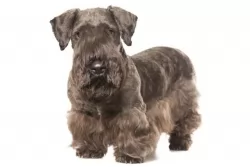 Known as the Bohemian Terrier and looking similar to a Scottish Terrier dog, the Cesky Terrier is a dog breed that has been created by Frantisek Horak, in the Czech Republic.
Known as the Bohemian Terrier and looking similar to a Scottish Terrier dog, the Cesky Terrier is a dog breed that has been created by Frantisek Horak, in the Czech Republic.
Horak wanted to breed a type of hunting dog, and in 1949, using both the Scottish Terrier ad the Sealyham Terrier, he bred the two, creating a new breed that would hopefully be a stronger hunting dog.
The Cesky Terrier was shown for the first time in 1959 and was recognized by the Federation Cynologique Internationale in 1963 and in 1993 by the United Kennel Club. It’s a rare dog this, and is the national dog of the Czech Republic.
 The Koolie, as a breed we know today, originates from Australia. But, before they were breed and imported, they were the mix made of Britain smooth coated blue merle Collie and the Black and Tan Collie from the Highlands of Scotland. The Koolie came to Australia to work as a kennel dog since they are known as the working, farm dog that can adapt to any weather condition. They were bred to be agile and non-aggressive quiet herding dogs, and they have kept most of those good characteristics until today.
The Koolie, as a breed we know today, originates from Australia. But, before they were breed and imported, they were the mix made of Britain smooth coated blue merle Collie and the Black and Tan Collie from the Highlands of Scotland. The Koolie came to Australia to work as a kennel dog since they are known as the working, farm dog that can adapt to any weather condition. They were bred to be agile and non-aggressive quiet herding dogs, and they have kept most of those good characteristics until today.
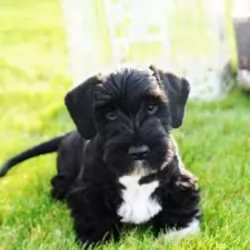 The Cesky Terrer is a longish dog, much like the Scottie and he also has short legs. He is roughly 29ck in height at the withers, is about 43cm in length and weighs anything from 5 to 10kg.
The Cesky Terrer is a longish dog, much like the Scottie and he also has short legs. He is roughly 29ck in height at the withers, is about 43cm in length and weighs anything from 5 to 10kg.
The coat of this dog is long, silky and quite wavy and can be in a number of different shades of gray or a light brown color. Puppies are born black. The soft coat can be kept groomed by clippers or you can take him to have his coat professionally trimmed.
This dog breed has natural drop ears, unlike the Scottie which has erect ears. The tail length is 18-20 cm and low set.
A loyal, quiet and loving family dog, the Cesky Terrier will get on well with children in the home and he is also friendly with other dogs. Just like with any other dog, it will be important to socialize the dog breed at an early age as then he becomes obedient, smart and relaxed. He is a breed which is also easy to train. He also makes a good watchdog.
 Koolie is a medium bred. Their head is small, with a pointy jaw. Ears are pricked, semi-dropped or dropped. Their coat can be smooth or rough, short or medium length, always with the undercoat. The colours can be Red or Blue Merle, solid Red or Black, sometimes with minimal white or cream speckles. They are usually two-coloured or tricoloured, but some of them are actually one-coloured.
Koolie is a medium bred. Their head is small, with a pointy jaw. Ears are pricked, semi-dropped or dropped. Their coat can be smooth or rough, short or medium length, always with the undercoat. The colours can be Red or Blue Merle, solid Red or Black, sometimes with minimal white or cream speckles. They are usually two-coloured or tricoloured, but some of them are actually one-coloured.
Some Koolie have one or two blue, green or yellow eyes. Eye colour is, of course, affected by the gene that creates the coat pattern and eye colour as well.
They are athletic dogs, with fine bone structure but great stamina. Actually, they were breed to be like that – to work hard, be noticeable among the sheep, eat little and be loyal to one person.
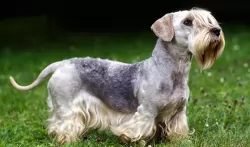 The Cesky Terrier isn’t a small-dog yapper and he will adapt to life in the city or the country. He is a small dog, but he is feisty and sporty and will willingly join you with your jogging or when you go on a walk.
The Cesky Terrier isn’t a small-dog yapper and he will adapt to life in the city or the country. He is a small dog, but he is feisty and sporty and will willingly join you with your jogging or when you go on a walk.
He is intelligent and playful and when you add in characteristics such as being courageous, loving, loyal and feisty, you can see that the Cesky Terrier is guaranteed to make a super family pet.
 Koolie is naturally energetic, playful and affectionate so they are naturally very good to raise with children.
Koolie is naturally energetic, playful and affectionate so they are naturally very good to raise with children.
They are known as great obedience dog. They are very famous as the tracking dogs.
Some of them are successful as the rescue dogs, therapy dogs or educators for school children.
This is not a type of dog that will be alone in the house, wait for you and then be quiet while you rest. They need a great deal of activity and they are not such great choice for indoor life anyways. The best thing for them would be the large yard, with somebody home most of the time. They are great if raised in a family, with children and active owners. They will be great for a loner at the farm as well since that is in their blood. They need enough place to run, chase, play, rest on the sun and be active as they please. They get affectionate towards their families, but they will be accepting their new home when they are older just fine.
They are very good at learning. Intelligent, yes, but yet very silly and playful to do what is told all the time. They will surprise you with how quickly they will pick up the new trick but not feeling like doing it every time you would like them to. Everything is a play for them, so it would be best if you know how to play, be affectionate and friendly to become a good owner of this breed.
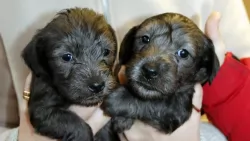 The Cesky Terrier is generally a healthy dog, but this breed sometimes suffers from common dog ailments that other breeds also have to contend with.
The Cesky Terrier is generally a healthy dog, but this breed sometimes suffers from common dog ailments that other breeds also have to contend with.
Eye disorders, ear infections, pancreatitis, hip dysplasia and weight gain are just some health issues you might need to be aware of.
Remember that if you want to promote a healthier dog, feeding him a quality diet and taking him immediately to the vet when you suspect a problem can keep him free from common dog illnesses.
Pancreatitis for instances develops when the pancreas becomes inflamed, and this can be brought on by allowing your pet to become obese. There are other reasons for pancreatitis too such as infection. You will see diarrhea, fever and vomiting with your pet as well as discomfort from abdominal pain. It’s a disease which affects smaller dogs more often than larger breeds.
 If you are careful enough, you will choose your Koolie form patiently chosen breeders, after checking the health history of the pup and the pup’s family. Advisable is to do these things in person and never to buy a Koolie from a pet shop.
If you are careful enough, you will choose your Koolie form patiently chosen breeders, after checking the health history of the pup and the pup’s family. Advisable is to do these things in person and never to buy a Koolie from a pet shop.
Sometimes, pups can be born blind or deaf pups. They have the great chance of joint problems because of their extreme activity. Their need to run, jump and play all the time may result in damage to cartilage and ligaments, especially since they are not aware of their age most of the time.
There is a chance that pup has skin allergies or immune system issues if they are growing on a farm near the chemicals used for plants, so be careful what kind of herbicide you use if you have a Collie.
In some rare cases, they suffer from seizers. If untreated, they can cause death. If you decide to take him to a regular vet check, you will have a happy and playful life together.
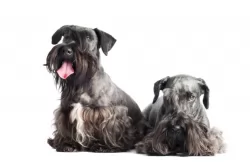 Cesky Terriers may well be a little bit less active and quieter than other terriers, but they will still need a good dose of exercise. He loves to dig, and if he is bored and doesn’t have a plenty of exercise and games, he will want to dig more and cause the owner a lot of frustration. Take him for daily walks and give him some ball games in the garden.
Cesky Terriers may well be a little bit less active and quieter than other terriers, but they will still need a good dose of exercise. He loves to dig, and if he is bored and doesn’t have a plenty of exercise and games, he will want to dig more and cause the owner a lot of frustration. Take him for daily walks and give him some ball games in the garden.
Cesky Terriers will need brushing down at least twice a week and their coats will need to be trimmed into shape every 8 to 10 weeks or so. You’ll also need to check excess hair inside the ears.
As with any dog breed, you will need to check on his nails so that they don’t grow too long and also brush his teeth 2 or 3 times a week to avoid dental disease.
 Whether you choose canned food or dry food, treats as biscuits or left-overs, the quantity is the safest way of keeping the balanced diet for your Collie. They like raw meat and raw bones. Make sure not to feed them with cooked bones because they can do more harm than good.
Whether you choose canned food or dry food, treats as biscuits or left-overs, the quantity is the safest way of keeping the balanced diet for your Collie. They like raw meat and raw bones. Make sure not to feed them with cooked bones because they can do more harm than good.
Since Koolie coat can be very short with the undercoat or a bit longer with undercoat, bristle brushing every 3 or 4 days will be enough for them. Some of them like the water and some of them don’t and that is perfectly fine since there is no need for a regular bath.
Lots of activities and lots of love. They express their love all the time and you can learn a lot from them actually. They like raw bones and from-the-table delicious treats but make sure not to overfeed them.
Games that need them to be fast and think quickly. Running with them, driving a bike with them (but not on the leash!) would be a great fun for them. Why not leash? They are so playful and happy and they tend to jump and run to the side to chase a butterfly or catch the falling leaf.